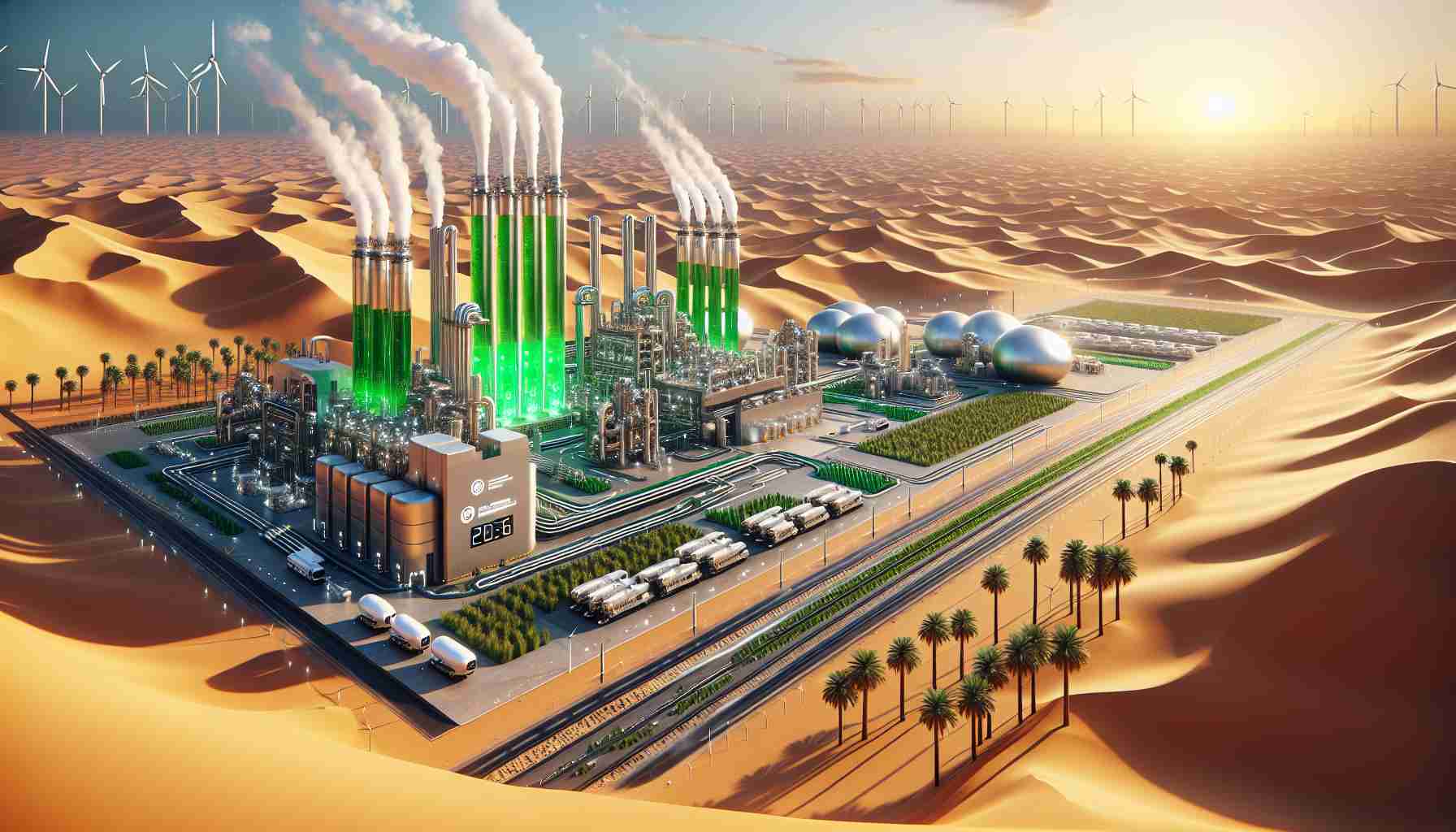- Saudi Arabia plans to export 200,000 tons of green hydrogen to Europe annually by 2030.
- This initiative is a result of a partnership between ACWA Power and Germany’s SEFE Energy Company.
- The collaboration aims to create a hydrogen bridge to aid Europe’s decarbonization efforts.
- The agreement aligns with Germany’s strategies to diversify energy sources in light of the Russia-Ukraine conflict.
- Hydrogen is considered essential for reducing carbon emissions and powering various industries.
- This partnership marks a significant move toward a sustainable global energy future.
In a groundbreaking agreement, Saudi Arabia is set to become a key player in the green hydrogen market, planning to export 200,000 tons of this eco-friendly fuel to Europe annually by 2030. This ambitious venture stems from a memorandum of understanding signed between Saudi ACWA Power and Germany’s SEFE Energy Company, marking a transformative step for both nations.
With the eyes of the world on sustainability, this partnership promises to create a vital hydrogen bridge between Saudi Arabia and Germany. The CEO of ACWA Power emphasized that this collaboration harnesses Saudi expertise in green hydrogen production alongside SEFE’s unparalleled market insight. Together, they aim to provide substantial quantities of hydrogen, playing a pivotal role in Europe’s push towards decarbonization.
This announcement coincides with the visit of German President Frank-Walter Steinmeier to Saudi Arabia, where he seeks to strengthen energy ties amidst Europe’s urgent search for alternative energy sources exacerbated by the ongoing Russia-Ukraine conflict. Germany has also secured hydrogen import deals with Brazil and Norway, showcasing its commitment to a greener future.
Hydrogen is hailed as a crucial energy solution, minimizing carbon emissions and powering industrial machinery, heavy vehicles, and heating systems. As countries grapple with the realities of climate change, this new partnership signals a promising shift toward a more sustainable global energy landscape.
Key takeaway: Saudi Arabia is not just exporting energy; it is forging a greener tomorrow for Europe, setting a new standard in the global energy transition.
Saudi Arabia and Germany: A Game-Changing Partnership for a Green Hydrogen Future
Saudi Arabia’s Green Hydrogen Ambitions
In a significant move that could reshape the energy landscape, Saudi Arabia plans to export 200,000 tons of green hydrogen to Europe every year by 2030. This initiative follows a memorandum of understanding between Saudi ACWA Power and Germany’s SEFE Energy Company, emphasizing Saudi Arabia’s commitment to sustainable energy production. The collaboration aims to not only bolster hydrogen supply but also strengthen bilateral energy relations.
Market Forecast: The Rise of Green Hydrogen
The global green hydrogen market is projected to reach $209 billion by 2030, growing at a CAGR of over 54% from 2021. This growth is driven by increased investments in renewable energy and decarbonization efforts globally. The partnership between Saudi Arabia and Germany is poised to play a central role in this expansion.
Pros and Cons of the Saudi-German Hydrogen Partnership
Pros:
– Sustainable Energy Source: Green hydrogen can significantly reduce reliance on fossil fuels.
– Economic Growth: The partnership can foster job creation and economic benefits in both countries.
– Decarbonization Efforts: Contributes to Germany’s goals of achieving carbon neutrality by 2045.
Cons:
– Initial Costs: High production and infrastructure costs may limit immediate affordability.
– Logistical Challenges: Transporting hydrogen across long distances presents technical and safety challenges.
– Dependency Risks: Germany might become overly reliant on a single source of hydrogen.
Trends and Insights
The partnership is part of a broader trend of countries embracing green hydrogen as a key component of their energy strategies. With increasing government policies aimed at sustainability, nations are investing heavily in hydrogen production technologies. This transition is not only about energy supply but also about creating a more resilient and independent energy future.
Limitations of Green Hydrogen
Despite its potential, there are limitations to consider:
– Energy Efficiency: The energy conversion process can be inefficient, requiring significant energy input.
– Infrastructure Needs: A robust infrastructure for production, storage, and transport of hydrogen is still in developmental stages.
– Water Usage: Producing green hydrogen through electrolysis requires substantial water resources, which could be challenging in arid regions.
Pricing Dynamics
The cost of green hydrogen is currently higher compared to conventional hydrogen. However, as technology evolves and production scales, prices are expected to drop. Experts predict that by 2030, green hydrogen could become competitive with fossil fuels, thanks to advancements in electrolyzers and renewable energy sources.
Predictions on Market Evolution
As more countries invest in hydrogen technologies and infrastructure, the competitive landscape is expected to shift. Analysts predict that by 2040, green hydrogen will account for 24% of the global energy mix, signifying a major transformation in how energy is produced and consumed.
Compatibility and Innovations
The collaboration between Saudi Arabia and Germany may also lead to significant innovations in hydrogen production technology. This includes advancements in:
– Electrolysis methods to improve efficiency.
– Hydrogen fuel cells for vehicles and industrial applications.
– Storage solutions to make hydrogen transport feasible across large distances.
Related Questions
1. What role does green hydrogen play in global decarbonization efforts?
Green hydrogen is seen as a clean alternative to fossil fuels, helping industries reduce carbon footprints and enabling countries to meet climate targets.
2. How does the Saudi-German partnership influence energy security in Europe?
By diversifying energy sources and reducing reliance on traditional oil and gas supplies, this partnership strengthens energy security amidst geopolitical uncertainties.
3. What are the technological advancements expected in hydrogen production?
Innovations in electrolyzer technology, hydrogen storage methods, and carbon capture utilization are anticipated, making green hydrogen more efficient and accessible.
For further information on green hydrogen and its implications in the energy sector, visit ACWA Power and SEFE Energy.

